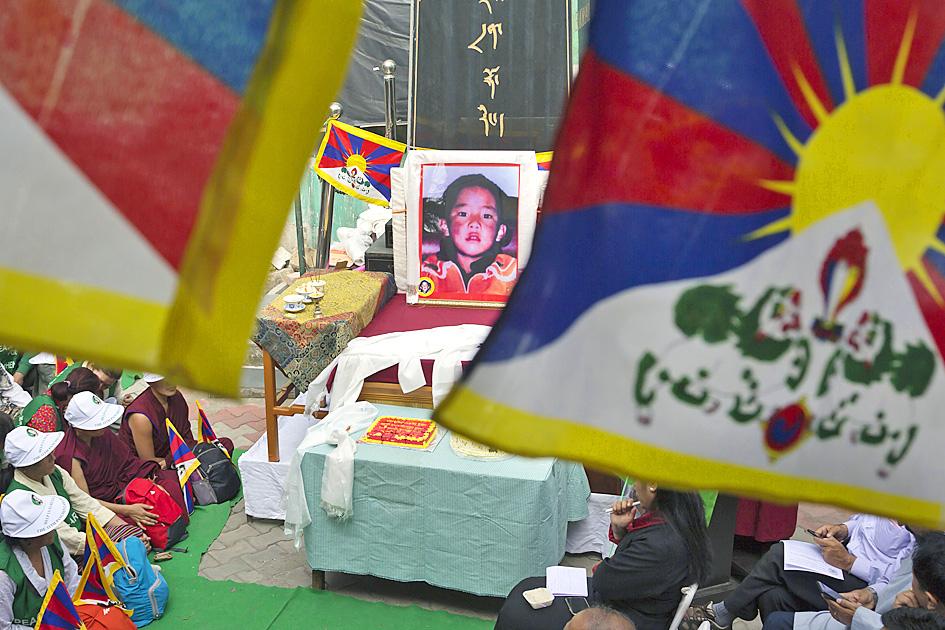Tibet’s self-declared government-in-exile in India yesterday marked the 25th anniversary of the disappearance of a boy named as Tibetan Buddhism’s second-highest figure by calling on China to account for his whereabouts.
The Tibetan parliament in Dharamsala, India, known as the Kashag, said Gedhun Choekyi Nyima, who was named as the 11th Panchen Lama and who was taken away at age six along with his family in 1995, continued to be recognized as the sole legitimate holder of his title.
Beijing, which claims Tibet as its own territory, named another boy, Gyaltsen Norbu, to the position and he is believed to live under close government control in China and is rarely seen in public.

Photo: AP
“China’s abduction of the Panchen Lama and forcible denial of his religious identity and right to practice in his monastery is not only a violation of religious freedom, but also a gross violation of human rights,” the Kashag statement said.
“If China’s claim that Tibetans in Tibet enjoy religious freedom is to be considered true, then China must provide verifiable information on the well-being and whereabouts of the 11th Panchen Lama” along with others, the statement said.
The dispute mainly focuses on political power and the arcane rituals for naming a new Panchen Lama, believed to be the reincarnation of his predecessor.
The Dalai Lama named Gedhun Choekyi Nyima as the 11th Panchen Lama with the help of Tibetan lamas trained in reading portents and signs.
China claims the reincarnate can only be chosen by pulling lots from a golden urn, a method it used to pick its own candidate under strict control of the Chinese Communist Party (CCP).
Traditionally, the Panchen Lama has served as teacher and aide to the Dalai Lama, Tibetan Buddhism’s highest leader.
Despite appeals from the UN and foreign governments and organizations, China has never provided any solid information on the condition or location of Gedhun Choekyi Nyima and his family, saying only that they did not wish to have contact with the outside world.
The 10th Panchen Lama, a controversial figure who had initially supported the CCP’s rule over Tibet before turning critical and being imprisoned by Beijing, renounced his vows as a monk in 1978. He was politically rehabilitated in 1982 after marrying the daughter of a top Chinese general.
He died in suspicious circumstances during a visit to Shigatse, the traditional seat of the Panchen Lamas, at the age of 50 in January 1989 after making speeches calling for greater religious and social freedoms for Tibetans.
Additional reporting by staff writer

INVESTIGATION: The case is the latest instance of a DPP figure being implicated in an espionage network accused of allegedly leaking information to Chinese intelligence Democratic Progressive Party (DPP) member Ho Jen-chieh (何仁傑) was detained and held incommunicado yesterday on suspicion of spying for China during his tenure as assistant to then-minister of foreign affairs Joseph Wu (吳釗燮). The Taipei District Prosecutors’ Office said Ho was implicated during its investigation into alleged spying activities by former Presidential Office consultant Wu Shang-yu (吳尚雨). Prosecutors said there is reason to believe Ho breached the National Security Act (國家安全法) by leaking classified Ministry of Foreign Affairs information to Chinese intelligence. Following interrogation, prosecutors petitioned the Taipei District Court to detain Ho, citing concerns over potential collusion or tampering of evidence. The

Seventy percent of middle and elementary schools now conduct English classes entirely in English, the Ministry of Education said, as it encourages schools nationwide to adopt this practice Minister of Education (MOE) Cheng Ying-yao (鄭英耀) is scheduled to present a report on the government’s bilingual education policy to the Legislative Yuan’s Education and Culture Committee today. The report would outline strategies aimed at expanding access to education, reducing regional disparities and improving talent cultivation. Implementation of bilingual education policies has varied across local governments, occasionally drawing public criticism. For example, some schools have required teachers of non-English subjects to pass English proficiency

NEGOTIATIONS: The US response to the countermeasures and plans Taiwan presented has been positive, including boosting procurement and investment, the president said Taiwan is included in the first group for trade negotiations with the US, President William Lai (賴清德) said yesterday, as he seeks to shield Taiwanese exporters from a 32 percent tariff. In Washington, US Trade Representative Jamieson Greer said in an interview on Fox News on Thursday that he would speak to his Taiwanese and Israeli counterparts yesterday about tariffs after holding a long discussion with the Vietnamese earlier. US President Donald Trump on Wednesday postponed punishing levies on multiple trade partners, including Taiwan, for three months after trillions of US dollars were wiped off global markets. He has maintained a 10 percent

TRADE: The premier pledged safeguards on ‘Made in Taiwan’ labeling, anti-dumping measures and stricter export controls to strengthen its position in trade talks Products labeled “made in Taiwan” must be genuinely made in Taiwan, Premier Cho Jung-tai (卓榮泰) said yesterday, vowing to enforce strict safeguards against “origin laundering” and initiate anti-dumping investigations to prevent China dumping its products in Taiwan. Cho made the remarks in a discussion session with representatives from industries in Kaohsiung. In response to the US government’s recent announcement of “reciprocal” tariffs on its trading partners, President William Lai (賴清德) and Cho last week began a series of consultations with industry leaders nationwide to gather feedback and address concerns. Taiwanese and US officials held a videoconference on Friday evening to discuss the